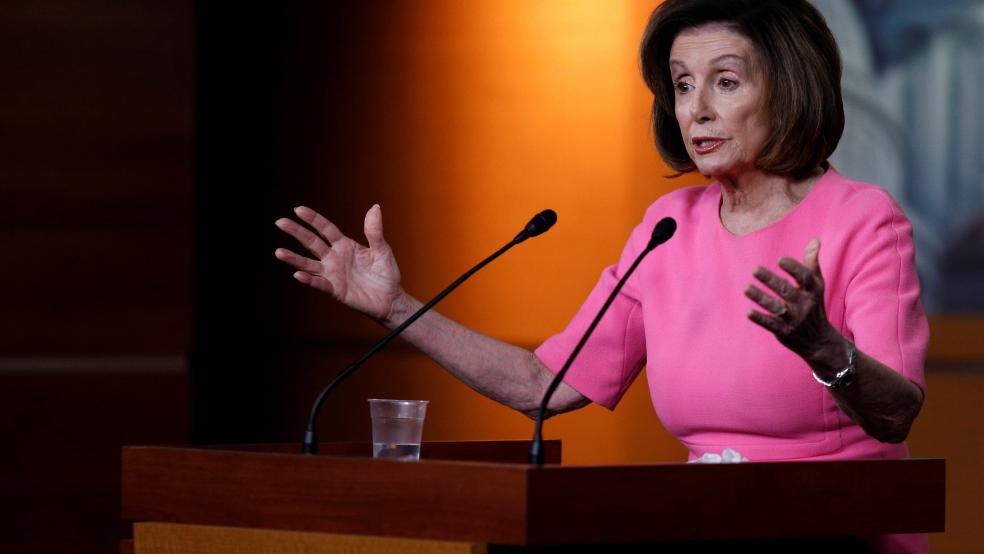Congress isn’t anywhere close to a consensus on the next coronavirus relief bill.
The Senate plans to return to the Capitol next week, and House Speaker Nancy Pelosi suggested Thursday that her chamber would reconvene the week of May 11 after putting off plans to come back next week, citing guidance from the Capitol physician. But as lawmakers look to add to the nearly $3 trillion they’ve already provided to address the pandemic, it will likely take weeks longer to reach agreement on the details of any new stimulus plan.
In a note to clients Thursday, analyst Chris Krueger of the Cowen Washington Research Group laid out 10 areas negotiators are likely to focus on:
1. Direct cash payments (and hazard pay for frontline workers);
2. Tax relief (President Trump continues to talk about a payroll tax holiday, though a delay may be more likely);
3. Social safety net programs (food stamps and a further extension of enhanced unemployment insurance benefits);
4. Small business grants/Paycheck Protection Program funding
5. State/local government aid (see more below);
6. Money for hospitals and testing;
7. Broadband infrastructure
8. China/supply chains (tax breaks for re-onshoring)
9. Sector-specific bailouts
10. Pension relief
The list of sticking points and potential disputes is also long. Here’s a look at the two main hurdles that have emerged early on in the debate.
Additional aid to states: Pelosi said at her weekly news conference Thursday that state and local governments are seeking $1 trillion in aid in the next coronavirus bill, money that would help avoid sweeping cuts to jobs and services that could prolong the economic downturn. “We’re not going to be able to cover all of it, but to the extent that we can keep the states and localities sustainable, that’s our goal,” she said, adding that the additional money was strictly for helping with coronavirus costs and related revenue losses.
GOP lawmakers immediately dismissed Pelosi’s $1 trillion figure. “That strikes me as a pretty outrageous number, just for state and local support. We’ve already provided $150 billion,” Sen. John Cornyn (R-TX) told reporters. Cornyn reportedly said he would support giving states more flexibility in how they can use the $150 billion provided as part of the $2 trillion Cares Act last month, money that was expressly for coronavirus response and not plugging budget holes.
More broadly, President Trump and Republicans say they don’t want to bail out the predominantly blue states that they claim have long mismanaged their budgets. “The broad viewpoint on the right has been that state governments have been so irresponsible for so long that Washington Republicans don’t trust them to disclose the costs that are just from the virus,” Brian Riedl, a senior fellow at the conservative Manhattan Institute, told Bloomberg.
Trump has also suggested he may link additional funding for states and cities to immigration policies. “If you're going to get aid to the cities and states for the kind of numbers you're talking about, billions of dollars, I don't think you should have sanctuary cities," Trump said Wednesday.
Protecting businesses from lawsuits: Businesses want Congress to shield them from lawsuits as they seek to reopen, and Republicans have made this a priority. Senate Majority Leader Mitch McConnell has said that any additional aid to state and local governments would have to be paired with such legal protections, and the Trump administration has expressed support as well. “We don’t need an epidemic of lawsuits in the wake of the pandemic," McConnell told Fox News on Thursday. "And so if we do another rescue package, and we may, we need to take our time, do it right, and it needs to include these liability protections so that all of these brave workers and brave businesses that will be reopening are not subjected to this second epidemic of litigation.”
Democrats, unions and trial attorneys oppose the idea, with some charging that McConnell is trying to use the crisis to advance tort reforms that have long been part of the GOP agenda. “At the time of this coronavirus challenge, especially now, we have every reason to protect our workers and our patients in all of this,” Pelosi said on Wednesday. “So we would not be inclined to be supporting any immunity from liability.”





